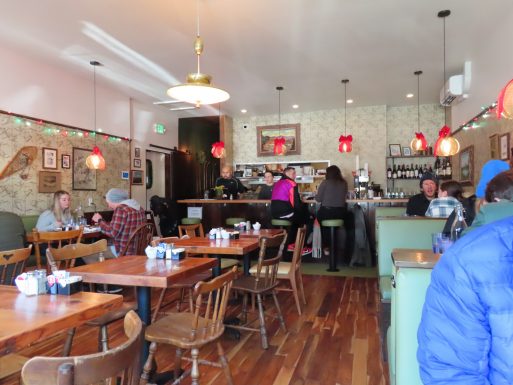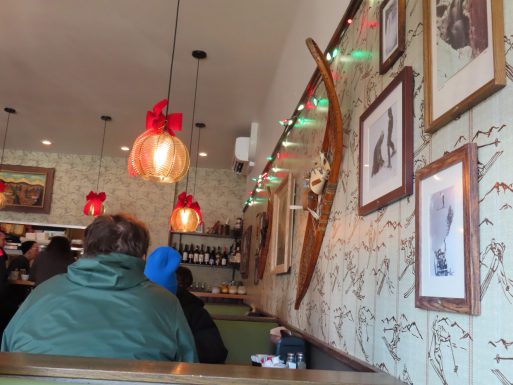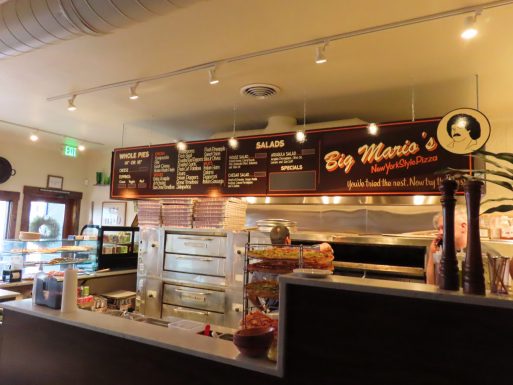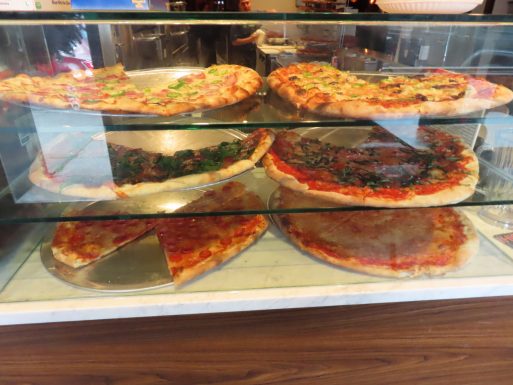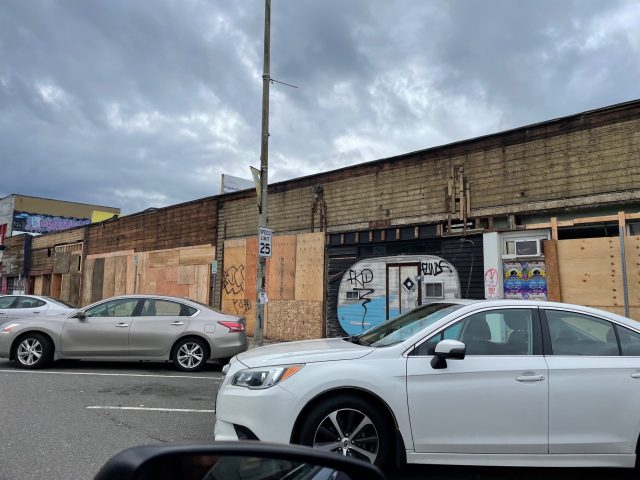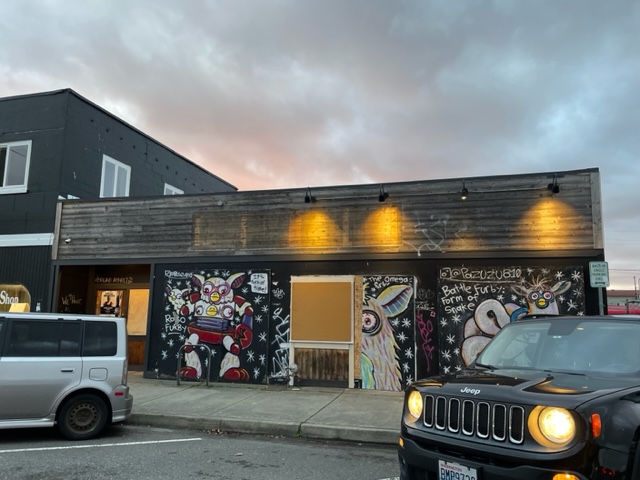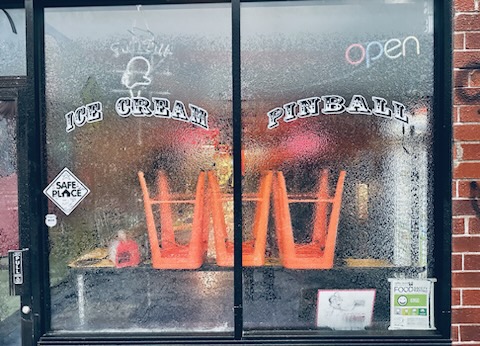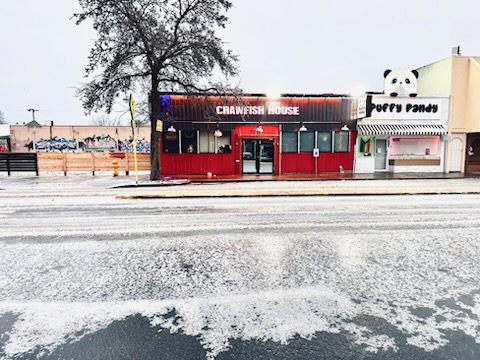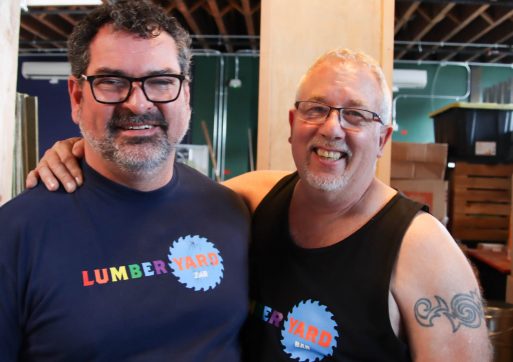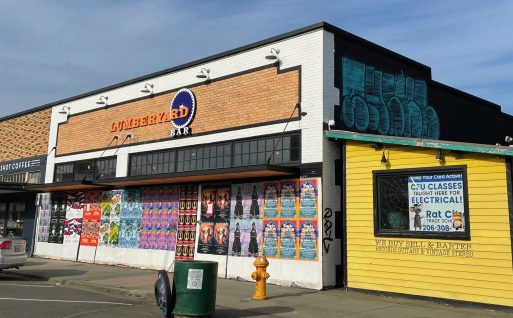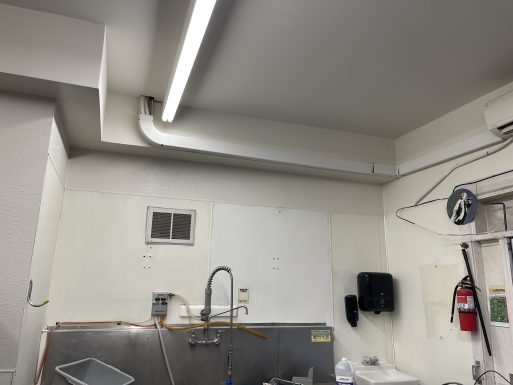We’ve learned that three local Safeway stores, including the one just west of White Center on SW Roxbury, will start closing an hour earlier as of this Wednesday (January 10). The other two are in West Seattle. Regional spokesperson Sara Osborne explains, “Almost all our stores in City of Seattle close at midnight or 11 pm once those three are included. The decision was made out of concern for the safety of our associates and customers because we are experiencing a significant increase of violent incidents and major theft, especially at late hours.” The Safeway at 1st and 148th in Burien already closes at midnight.
Roxbury Safeway to start closing earlier
January 7th, 2024 Tracy Posted in Businesses, White Center news 2 Comments »
RESTAURANTS: Inside newly opened Alpine Diner/Big Mario’s Pizza
December 10th, 2023 Tracy Posted in Businesses, Restaurants, White Center news 1 Comment »
This was the first weekend for the co-housed Alpine Diner and Big Mario’s Pizza at 9635 16th SW in downtown White Center. Thanks to Gill Loring for sharing some photos from inside the new two-in-one restaurant:
As we first reported a month ago, other repaired storefronts in that block are now up for lease.
FOLLOWUP: Changes ahead for downtown White Center’s fire-ravaged block, including 2 restaurants
November 14th, 2023 Tracy Posted in Businesses, Restaurants, White Center news 4 Comments »
If you’ve been in downtown White Center lately, you’ve probably noticed changes to the fire-ravaged block on the west side of 16th SW south of Roxbury. It’s been more than two years since fires ravaged multiple spaces in this block of businesses. Now seven of the spaces are up for lease to new business tenants (here’s the flyer). The spaces totaling 22,362 square feet could be leased in various combinations, the listing says … Not far south, next to Full Tilt, the Huong Xua Deli is finally getting ready to reopen, with COMING SOON signage … And on the other side of the September 2021 fire site, two venues have uncloaked with plans to share the former Bizzarro Italian Café space at 9635 16th SW:
The Alpine Diner and Bar, touting an “apres-ski” theme, and Big Mario’s Pizza. From the Alpine website:
Try our full food & beverage menu available daily from 7 AM to 10 PM, or visit the bar counter and cozy up to our vintage fireplace in the game room for ski ball and hoops. Enjoy our large outdoor patio with bocci ball and outdoor seating, opening Spring 2024. We share our space with the newest Big Mario’s location, meaning you can order from either menu.
The Alpine is from the same company that operates Lost Lake Café in Seattle’s Capitol Hill neighborhood; Big Mario’s Pizza has a location there too, one of four in Seattle. The remodeled White Center space is expected to open this winter.
Need storefront-repair money? King County says grant applications are open
October 5th, 2023 Tracy Posted in Businesses, White Center news Comments Off on Need storefront-repair money? King County says grant applications are open
From King County Local Services:
A new grant program is available to small businesses in unincorporated King County that have experienced vandalism or break-ins since the COVID-19 pandemic began in March 2020.
The King County Department of Local Services Storefront Repair Program is intended to address vandalism and enhance security in business districts of the unincorporated areas. The program serves small businesses (10 employees or less) by providing a one-time grant up to $5,000 to repair and damage and restore storefronts of commercial buildings occupied by operating businesses. Retail, grocery, food service, and personal, professional, or medical services are eligible to apply.
Eligible expenses include:
Repair or replacement of windows, doors, exterior lighting, signs, or awnings
Replacement of security screens or bars, graffiti removal, security cameras, and insurance claim deductiblesFor program guidelines and applications, see the Storefront Repair Grant Program page. For questions or application assistance, email localbusinessgrants@kingcounty.gov
Applications will be accepted through Dec. 31, 2023, subject to funding availability.
WHITE CENTER BIZNOTE: Bartell farewell
September 28th, 2023 Tracy Posted in Businesses, White Center news Comments Off on WHITE CENTER BIZNOTE: Bartell farewell
White Center Bartell Drugs employees tell customers their store will close
September 7th, 2023 Tracy Posted in Businesses, White Center news 3 Comments »
Also published on partner site West Seattle Blog
Three years after the national chain Rite Aid acquired Seattle-founded regional chain Bartell Drugs, it’s closing some Bartell stores. And employees of the White Center Bartell store (9600 15th SW) are telling customers theirs will soon be among them. We’ve heard from multiple readers who say they’ve been told in recent days that the store will close at the end of the month, and a visit to the store reveals many items on sale at deep discounts. We have inquired with both Rite Aid and Bartell corporate spokespeople via email and phone, but have yet to receive a reply or acknowledgment either confirming or denying. As we reported here last year, the White Center store’s building changed ownership a year and a half ago, purchased for $5.1 million by an LLC associated with a California electrical contractor (we have an inquiry out to the owner as well). King County permit records show nothing on file for the sizable site. When the 4th Avenue Bartell store in downtown Seattle closed in July, The Seattle Times reported that was the fifth Bartell closure in less than a year; since then, one more has been announced. All this is unfolding against a backdrop of financial challenges for parent company Rite Aid.
King County Council passes proposal to prevent unincorporated-area businesses from going cashless – starting in two years
June 28th, 2023 Tracy Posted in Businesses, King County, Politics, White Center news Comments Off on King County Council passes proposal to prevent unincorporated-area businesses from going cashless – starting in two years
Announced by the King County Council:
The King County Council on Tuesday voted 5-4 to approve legislation to require retail businesses in unincorporated King County to accept cash. The measure, brought by Councilmember Jeanne Kohl-Welles, is meant to ensure everyone has access to the economy, including people who cannot or choose not to access bank accounts, credit cards, and other financial tools.
“This legislation has been an important and sometimes challenging balancing act – trying to protect consumer access, support local businesses, and adapt to a changing world all at the same time,” Kohl-Welles said. “I am very pleased that the legislation as passed addresses this emerging equity issue in a way that is creative, proactive, and collaborative. Further, it signals that as technology continues to rapidly change as we appear to be moving to a cashless society, there is a place for everybody in our local economy.”
During and even before the COVID-19 pandemic, many businesses in the Seattle area and beyond began shifting to cashless operations, leaving people who rely on cash with fewer options to purchase food and other essential consumer goods. Research, however, shows that cashless businesses most impact communities of color, seniors, people with disabilities, immigrants, refugees, kids, the houseless, and low-income communities.
At least 2.1% of Washington residents are unbanked, meaning they don’t have bank accounts, credit cards or other typical financial services, according to the 2021 FDIC Household Survey. Five-year estimates put that number even higher – at 3.1%. More than 17% of residents are underbanked, meaning they might have a bank account but often rely on alternative financial services, such as money orders, check-cashing services, and payday loans.
If applied to unincorporated King County, these figures mean more than 7,000 people could be unbanked and more than 42,000 people could be underbanked.
The ordinance requires that retail businesses in unincorporated King County accept cash, unless exempted, for most in-person retail food and consumer goods transactions, and to not charge higher prices than for another form of payment. The requirement would not apply to a number of situations, such as transactions by mail, phone or over the internet; those when an employee is not present, such as at a kiosk; for transactions in which a deposit is required or for over $200 in a single transaction; or to businesses providing a device to convert cash to a prepaid card. The Executive branch will be required to analyze enforcement and implementation mechanisms and make a recommendation to the Council on an enforcement mechanism and any other implementation measures by December 1, 2024. The law will take effect on July 1, 2025.
To acknowledge safety concerns raised during the committee hearings, retailers will be able to apply to the Hearing Examiner for an exemption from the requirement to accept cash based on the unique hardships a retailer faces, including but not limited to history of theft, distance to a banking institution, home-based businesses, and businesses with only one employee on site at a time.
It’s unclear how many businesses in unincorporated King County have gone cashless, but Kohl-Welles intends the legislation to serve as a proactive tool to protect consumer access as this trend continues.
Of those who still use cash for most purchases, the largest shares are people of color and those with the lowest incomes, according to data from the Pew Research Center.
The legislation garnered a wide range of community support, including endorsements from the ACLU; ARC of King County; Asian Counseling and Referral Services; Banchero Disability Partners; Be: Seattle; CAIR-WA; Chief Seattle Club; El Centro de la Raza; Faith Action Network; Indian American Community Services; King County Sexual Assault Resource Center; League of Women Voters; Low Income Housing Institute; MAPS-AMEN (American Muslim Empowerment Network); Northwest Immigrant Rights Project; Puget Sound Advocates for Retirement Action; Purpose, Dignity, Action (Public Defenders Association); Rainier Beach Action Coalition; Real Change; Seattle/King County Coalition on Homelessness; Solid Ground; Transit Riders Union; UFCW 3000; and the White Center Community Development Association.
Legislation to address this issue has already been passed in New York City, Philadelphia, San Francisco, Washington D.C., and the states of Colorado, Massachusetts, and New Jersey. At the federal level, the bipartisan Payment Choice Act was passed out of the U.S. House of Representatives last year and has not yet been acted upon by the Senate. In addition to this Act, a similar Senate bill has also garnered bipartisan sponsorship.
“[Our vendors] ask you to allow [those] in unincorporated King County to buy a cup of coffee,” said Tiffani McCoy, Advocacy Director at Real Change. “To buy a bagel. To buy lunch. To buy diapers. To purchase whatever it is that they need.”
In response to the final action on the legislation, which included the addition of several amendments, Kohl-Welles said, “To produce meaningful change, compromise is often necessary, and contrary to the popular maxim, the perfect is not the enemy of the good. Even so, as amended, this legislation will promote the equity that our county holds to be its true north, helping real people, many of whom are too often overlooked, to live and engage in commerce in a way that works for them.”
Among those voting “no” was the Councilmember who represents this area, Joe McDermott.
Happy 15th anniversary, Full Tilt Ice Cream!
June 20th, 2023 Tracy Posted in Businesses, Full Tilt Ice Cream, White Center news 1 Comment »
(See a longer version of this story on our partner site West Seattle Blog)
Justin Cline, Ann Magyar, and kids Moss (12) and Ruby (6) have 15 reasons to celebrate today – that’s how many years since their family-owned Full Tilt Ice Cream opened its flagship shop at 9629 16th SW in White Center on June 20, 2008. To celebrate, they’re donating today’s profits to the White Center Food Bank. FT is open until 8 tonight.
P.S. Trivia point – Justin was a co-founder of this website, just a few months after launching the shop.
Meetup Thursday for LGBTQ business owners in White Center and West Seattle
May 8th, 2023 Tracy Posted in Businesses, White Center news 1 Comment »
Here’s the announcement for a first-ever event, happening Thursday:
West Seattle/White Center LGBTQ Business Owner Meetup
Thursday, May 11th | 7 pm to 9 pm
Launchpad Co-Working Space, 6030 California Ave SW, West SeattleIt’s about time LGBTQ West Seattle and White Center business owners gathered together for support, networking, and fun! Join us for our first-ever meetup Thursday, May 11th at 7 pm at Launchpad Co-Working space in Morgan Junction. Let’s get to know each other and see what ways we can support each other. This meetup is specifically for those who identify as LGBTQ and are local business owners (all-size businesses, contractors, entertainers/artists). Drinks and appetizers will be provided.
Hosted by Monica Colgan and Autumn Lovewell, owners of Youngstown Coffee, HeartBeet Cafe, and Launchpad.
FOLLOWUP: Tim’s Tavern announces opening-weekend music lineup
March 20th, 2023 Tracy Posted in Businesses, Music, White Center news 1 Comment »
When we spoke earlier this month with the co-proprietors of Tim’s Tavern, taking over the ex-Drunky Two Shoes space in downtown White Center, they weren’t ready to announce the music lineup for their opening weekend – but now they are. Here’s the poster and announcement:
The shows must go on! After almost 2 years of searching for a new location, local music champion and legendary live music dive bar Tim’s Tavern is reopening in White Center on March 31st, 2023 with an exceptional line-up of Seattle’s finest musicians.
The grand re-opening festivities include 3 nights full of performances from some of Seattles hottest acts including Marmalade, Grace Love, Asterhouse, Dining Dead, Low Hums, Randy Weeks & The Silent Treatment, and many more.
The new Tim’s (which stands for Together In Music) is located at 9655 16th Ave SW, will feature live music 7 nights a week, all ages shows, a dog friendly patio, and a full menu including plenty of gluten-free and plant-based options. Tim’s will be open from 2pm-12am to start but will be expanding hours in June to offer weekday lunch and live music brunch on weekends.
Co-owner and Chef Mason Reed has spent the last few years preparing meals backstage as a personal chef for many of music’s major artists that have passed through Oregon and Washington. Reed says “We are excited, honored and proud to bring the Tim’s spirit to White Center.”
Please keep an eye on TimsLiveMusic.com for further updates.
FOLLOWUP: Opening date set for new home of Tim’s Tavern in White Center
March 5th, 2023 Tracy Posted in Beverages, Businesses, Music, Restaurants, White Center news 5 Comments »
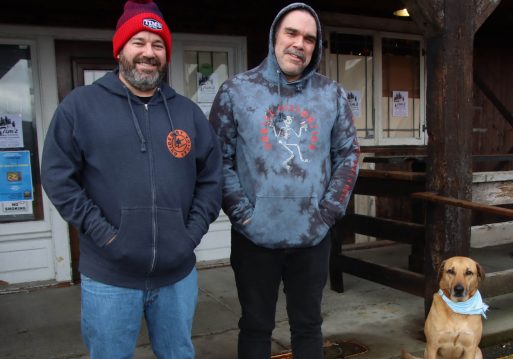 (WCN photo: Matt O’Toole, Mason Reed, and Elvis)
(WCN photo: Matt O’Toole, Mason Reed, and Elvis)
By Tracy Record
White Center Now editor
The transformation of White Center’s ex-Drunky Two Shoes into the new Tim’s Tavern is about halfway complete.
That’s the assessment of co-owners Matt O’Toole and Mason Reed, who sat down to talk with us this week, one month after they announced they were taking over 9655 16th SW.
They plan to open March 31st. But first, the rest of the transformation. If you ever went to Drunky’s, you might remember the taxidermy. All gone (though the salmon over the front door might stay). Since Tim’s is all about music – “music is our vibe” – they plan to fill the venue with history and memorabilia, new and old. And they’ll keep adding to it.
What has them particularly giddy is the extra space. The original Tim’s Tavern, which closed a year and a half ago in Greenwood, was only 1,000 square feet, they ecplain. Now they have so much room, they plan two music stages – out back with the Airstream bar (which stays), inside in a space dubbed the “Jesus room” – its new decor will be a “shrine to Seattle music history,” and it’ll be for acoustic acts, open mics, weekly trivia (Wednesday nights).
Inside, they’ll feature the sign that previously hung outside their Greenwood location; all new signage is planned outside, arriving soon, so that part of the transformation is close too.
So why White Center? They explain that it took almost two years to find a site that worked – big enough, not close enough to residences to “make the neighbors angry” – but in the end, it turned out to be a place they wanted to model Tim’s Tavern after anyway. Coming out of COVID, they explain, they thought outdoor space would be important, and so they kept telling their real-estate agent to look for someplace “like Drunky’s.” Mason marvels, “This was our model – then it became available!” (It closed rather quietly at the end of January; the Tim’s team says the prior proprietors are focusing on an establishment in Spokane.) Matt adds, “We’re going to put a lot of love in this place.”
They’ll have music seven nights a week, counting open mics on Mondays, with hours expected to be 2 to midnight for starters, then hoping to shift that earlier for lunch by June – White Center has limited lunch options, they note. Once lunch is launched, they’ll go for weekend brunch, “with some entertainment.” And yes, Tim’s will be all-ages, except for some 21+ shows outside. So what kind of food will they serve? Mason is in charge of that, with a resumé including gigs as a “backstage chef” for music stars. “Fun bar food, Northwest pub” is the style, he suggests, later adding that vegan and gluten-free options will be available too. They’ll even have a separate gluten-free fryer. Beverages? “Full wine list, full beer list, some slushies,” and a non-alcoholic cocktail lineup too. They promise it’ll all be “high quality (with) exceptional service” – Mason’s been in the restaurant business for 30 years. (Both co-owners are musicians, by the way.)
We tried to coax them into revealing what’s in store for the opening weekend’s music lineup, but they’re not ready to make the announcements. They do say they plan to book local favorites, mentioning that Billy Joe and the Dusty 45s, for one, will be there every month or so. And their longstanding reputation was as an “incubator,” which means rising stars are likely to be in the mix. So watch for news on the music slate later this month. Till then, as they continue “transforming” their new space, they are impressed by the “great vibe” in White Center, and how welcoming they say everyone’s been so far. They observe that people in White Center are “very proud” of their community, and they hope to be part of the reason for that pride, soon.
King County announces new program to boost businesses in unincorporated areas including White Center/North Highline
February 9th, 2023 Tracy Posted in Businesses, King County, White Center news Comments Off on King County announces new program to boost businesses in unincorporated areas including White Center/North Highline
Just out of the WCN inbox:
King County Executive Dow Constantine announced today the launch of the Economic Alliance Program, a collaborative effort between the Department of Local Services and community organizations in unincorporated King County. This new program will further help businesses and individuals recover and thrive as the region continues to emerge from the economic slowdown of the last three years due to the COVID-19 pandemic.
“The launch of the Economic Alliance Program is a critical step forward in our commitment to promote an equitable recovery for everyone in King County,” said Executive Constantine. “Partnering closely with community organizations throughout unincorporated King County will ensure the needs of businesses and individuals disproportionately impacted by the pandemic are better met and supported.”
The $5.25 million program, which was recommended by Executive Constantine and approved by the King County Council, was developed to address concerns voiced by unincorporated area business leaders and residents that local small businesses needed urgent help, particularly those owned by members of the BIPOC community, women, LGBTQ+, veterans, immigrants/refugees, low-income, limited-English speaking, and those living with disability who have been disproportionately impacted by the pandemic.
The Economic Alliance Program will focus on three main areas:
Career Connector: Low-barrier, highly supported workforce development and entrepreneurial training, living-wage career education, subsidized internships, and job placement for workers impacted by COVID-19.
Businesses Builder: Providing technical assistance for small businesses, including accounting, legal support, business planning, and more.
Community Innovator: Offer small business “incubation” resources, including networking opportunities, mentoring resources, and skills-based learning in disproportionately impacted areas of White Center/North Highline and Skyway/West Hill.
This month, Local Services turned to the community to help implement the program and its three elements by contracting with United for a Community Led Economy, a partnership co-founded by representatives of three groups that are embedded in the communities of their respective areas – the White Center Community Development Association, Skyway Coalition, and Comunidad Latina de Vashon.The Economic Alliance programming that United for a Community Led Economy will foster in the coming months is designed specially to meet the needs and recognize the challenges of businesses and residents in unincorporated King County.
Local Services serves as the local government for residents and businesses in unincorporated King County, including areas such as Skyway, White Center, Vashon Island, East Federal Way, the Snoqualmie Valley, Fall City, Greater Maple Valley, and the Bear Creek/Sammamish areas.
To learn more about the Economic Alliance, visit www.publicinput.com/ukcalliance.
WHITE CENTER BIZNOTE: Drunky’s out, Tim’s Tavern is in
February 4th, 2023 Tracy Posted in Businesses, Music, Restaurants, White Center news 3 Comments »
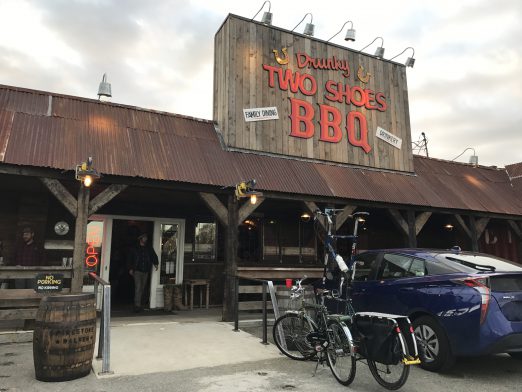
(WCN file photo)
Announced via social media, Tim’s Tavern – formerly an iconic North Seattle hot spot for live music – is taking over the Drunky Two Shoe BBQ spot in downtown White Center:
After almost 2 years of searching for a new location, local music champion and legendary live music dive bar Tim’s Tavern will be moving to White Center and setting up shop at 9655 16th Ave. SW, formerly Drunky’s BBQ.
“The wait is over for Tim’s and we couldn’t be happier with this new space and neighborhood. It’s finally time to rock again!” says co-owner and music curator Matthew “Matto” O’Toole.
The new location will be family- and dog-friendly and will feature live music 7 days a week on their covered/heated outdoor patio stage. Inside you’ll find a small arcade, full dining area, and bar.
Co-owner and Chef Mason Reed has spent the last few years preparing meals backstage as a personal chef for many of music’s major artists that have passed through Oregon and Washington. Reed says, “The food menu will consist of Pacific Northwest pub fare with plenty of plant-based and gluten-free options. We are excited, honored, and proud to be a part of the White Center neighborhood.”
The Tim’s team is planning on a soft opening for the end of March, with a week-long grand-opening celebration planned for early April. Please keep an eye on Timslivemusic.com for further announcements.
Tim’s Tavern closed in Greenwood a year and a half ago – read the backstory here. It’s been six years since Drunky’s took over the site, which previously had been DK Café.
ADDED MONDAY: A commenter asked about the Drunky’s closure. A note on the door says January 31st was their last day.
County councilmember proposes requiring businesses to accept cash
January 5th, 2023 Tracy Posted in Businesses, King County, White Center news 4 Comments »
From the office of County Councilmember Jeanne Kohl-Welles, a proposal that would affect White Center and vicinity if passed:
King County Councilmember Jeanne Kohl-Welles on Thursday introduced legislation to require businesses in unincorporated King County to accept cash. The measure is meant to ensure everyone has access to the economy, especially people who don’t or can’t access bank accounts, credit cards, and other financial instruments.
“When I am out and about, I am finding that more and more businesses are only accepting payment by credit cards or smart phones rather than cash,” Kohl-Welles said. “I believe the trend in this direction is highly problematic as it will prevent many people in our community who do not have bank accounts from participating in the economy. And this isn’t just a novel problem – it has the capacity to further hurt our most marginalized communities from accessing the goods and services they need to survive.”
During and even before the COVID-19 pandemic, many businesses in the Seattle area and beyond began shifting to cashless operation, leaving people who rely on cash with fewer options to purchase goods and services. Research, however, shows that cashless businesses most impact communities of color, seniors, people with disabilities, undocumented residents, refugee and immigrant and communities and low-income communities.
At least 2.1% of Washington residents are unbanked, meaning they don’t have bank accounts, credit cards, or other typical financial services, according to the 2021 FDIC Household Survey. Five-year estimates put that number even higher – at 3.1%. More than 17% of residents are underbanked, meaning they might have a bank account but often rely on alternative financial services, such as money orders, check-cashing services and payday loans.
If applied to King County, these figures mean approximately 67,000 people could be unbanked and more than 380,000 people could be underbanked.
It’s unclear how many – if any – businesses in unincorporated King County have gone cashless, but Kohl-Welles intends the proposal as a tool to anticipate a future issue as this trend continues.
“While it is true that this legislation will only pertain to unincorporated King County, I believe that King County is a trend- and example-setter,” Kohl-Welles said. “I am confident that if this ordinance is approved, we will bring attention on this burgeoning issue to a much wider audience.”
Of those who still use cash for most purchases, the largest shares are people of color and those with the lowest incomes, according to data from the Pew Research Center.
A shift to more cashless businesses would leave these people with fewer and fewer options to make purchases, including for food and essential services.
The legislation would require businesses in unincorporated King County to accept cash for most retail transactions, and to not charge higher prices than for another form of payment. It would allow for retailers to only accept up to $250 in cash payment for single transactions larger than that amount. It would allow for civil actions to be brought by someone whose cash payment was refused.
“Tens of thousands of King County residents are unbanked, especially low-income seniors,” said Katie Wilson, general secretary of the Transit Riders Union. “Already they’re locked out of so much in our high-cost region just because they can’t afford high rents or expensive meals. At the very least, everyone deserves to be able to buy the things they can afford. That’s why TRU supports this important legislation, to make sure that people don’t walk into a store and find out that their cash doesn’t count.”
The proposal (ordinance number 2023-0027) will be referred to the Local Services committee.
BIZNOTE: New ownership for Dubsea Coffee
January 3rd, 2023 Tracy Posted in Beverages, Businesses, Greenbridge, White Center news 1 Comment »
 13 years after its much-awaited opening in Greenbridge, Dubsea Coffee has new ownership. Founder Sibelle Nguyen made the announcement on social media, saying she has “passed the reins of Dubsea to Carrie and Erin Wilkins.” The couple, with a wide range of career and personal experiences, say in the announcement that they “had discussed running a coffee shop for some years.” They recognized Dubsea’s status as a community hub and promise to continue to grow it in that role. In her parting words, Sibelle expresses confidence that will happen, and adds, “Dubsea, both as a space and an intention, has shown me that it is more than possible for people of all walks of life to be together in kindness, sweet joy, creativity, and connection … in other words, a truly loving community.” She also offers words of gratitude to staff, artists, and customers.
13 years after its much-awaited opening in Greenbridge, Dubsea Coffee has new ownership. Founder Sibelle Nguyen made the announcement on social media, saying she has “passed the reins of Dubsea to Carrie and Erin Wilkins.” The couple, with a wide range of career and personal experiences, say in the announcement that they “had discussed running a coffee shop for some years.” They recognized Dubsea’s status as a community hub and promise to continue to grow it in that role. In her parting words, Sibelle expresses confidence that will happen, and adds, “Dubsea, both as a space and an intention, has shown me that it is more than possible for people of all walks of life to be together in kindness, sweet joy, creativity, and connection … in other words, a truly loving community.” She also offers words of gratitude to staff, artists, and customers.
WHITE CENTER WEATHER: Thaw time
December 23rd, 2022 Tracy Posted in Businesses, Weather, White Center news Comments Off on WHITE CENTER WEATHER: Thaw time
Thanks to the reader who texted photos from downtown White Center this morning – you can see why some businesses stayed closed (or closed early), like Full Tilt Ice Cream …
and Proletariat Pizza …
Crawfish House is open tonight until 9:
After being suspended all day because of the ice, Metro buses are back tonight, at least the routes on the Emergency Snow Network list are. The temperature is rising slowly and the ice is finally melting, so tomorrow – despite the forecast for rain – should be a better time to get out and do whatever you need to do before Christmas closures!
WHITE CENTER BIZNOTE: New tenant for ex-Northmart building
August 23rd, 2022 Tracy Posted in Businesses, White Center news Comments Off on WHITE CENTER BIZNOTE: New tenant for ex-Northmart building
We noticed the banner for Corry’s Dry Cleaning and Fuzzy Wuzzy Rug Company on the former Northmart building in downtown White Center. Those businesses share a location in West Seattle, north of The Junction business district, so we stopped there to ask about the plan for the WC building. No, they’re not moving – the plan is to use the White Center building for an expanded cleaning facility, they told us.
FOLLOWUP: Lumber Yard Bar not quite ready to (re)open yet
June 30th, 2022 Tracy Posted in Businesses, White Center news Comments Off on FOLLOWUP: Lumber Yard Bar not quite ready to (re)open yet
When we got a sneak peek inside the Lumber Yard Bar‘s new downtown location during the White Center Pride Street Festival, its owners told us they hoped to open at least part of the space July 1st. That’s tomorrow – but they’re not quite ready yet. They’re still vowing to open sometime in July. (If you’re just catching up – the new place at 9630 16th SW is across the street from the old spot, one of seven businesses gutted by arson a year ago.)
FOLLOWUP: New location for the Lumber Yard Bar close to opening
May 23rd, 2022 Tracy Posted in Beverages, Businesses, White Center news 1 Comment »
You have probably noticed the sign is now up at the new location of the Lumber Yard Bar in downtown White Center, almost 11 months after the fire across the street that gutted the original location and other businesses. So we checked in with the proprietors to see how soon they expect to open the new location (9630 16th SW). Reply: “We are hoping to open late next month.”
REOPENING: Full Tilt Ice Cream in White Center
January 17th, 2022 Tracy Posted in Businesses, Fire, Food, Full Tilt Ice Cream, White Center news 3 Comments »
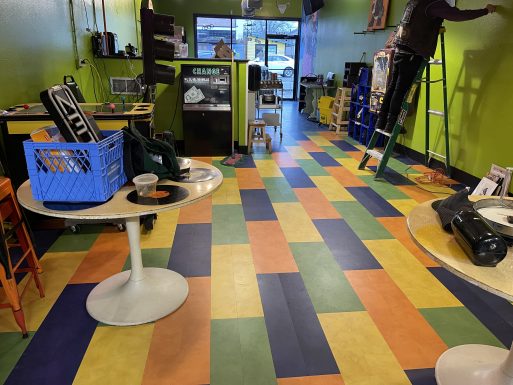 (White Center Now/West Seattle Blog photos)
(White Center Now/West Seattle Blog photos)
Four months after the fire that gutted the Locker Room Bar and Grill, one of the other businesses affected is about to reopen: Full Tilt Ice Cream‘s flagship location at 9629 16th SW reopens tomorrow (Tuesday, January 18th). We stopped by this evening as they finished getting ready.
That wall is an example of what had to be fixed before Full Tilt could reopen – firefighters had to break through it while working to stop the fire in September. And they’re two doors down from Locker Room; the damage was even worse at neighboring Huong Xua Deli and, on the other side of Locker Room, Bizzarro Italian Café. No updates on them yet (Bizzarro is still open in Wallingford). Full Tilt will reopen with a few new touches – like this Simpsons-themed pinball machine:
Hours will be the same as they were pre-fire – 3 to 8 pm.

